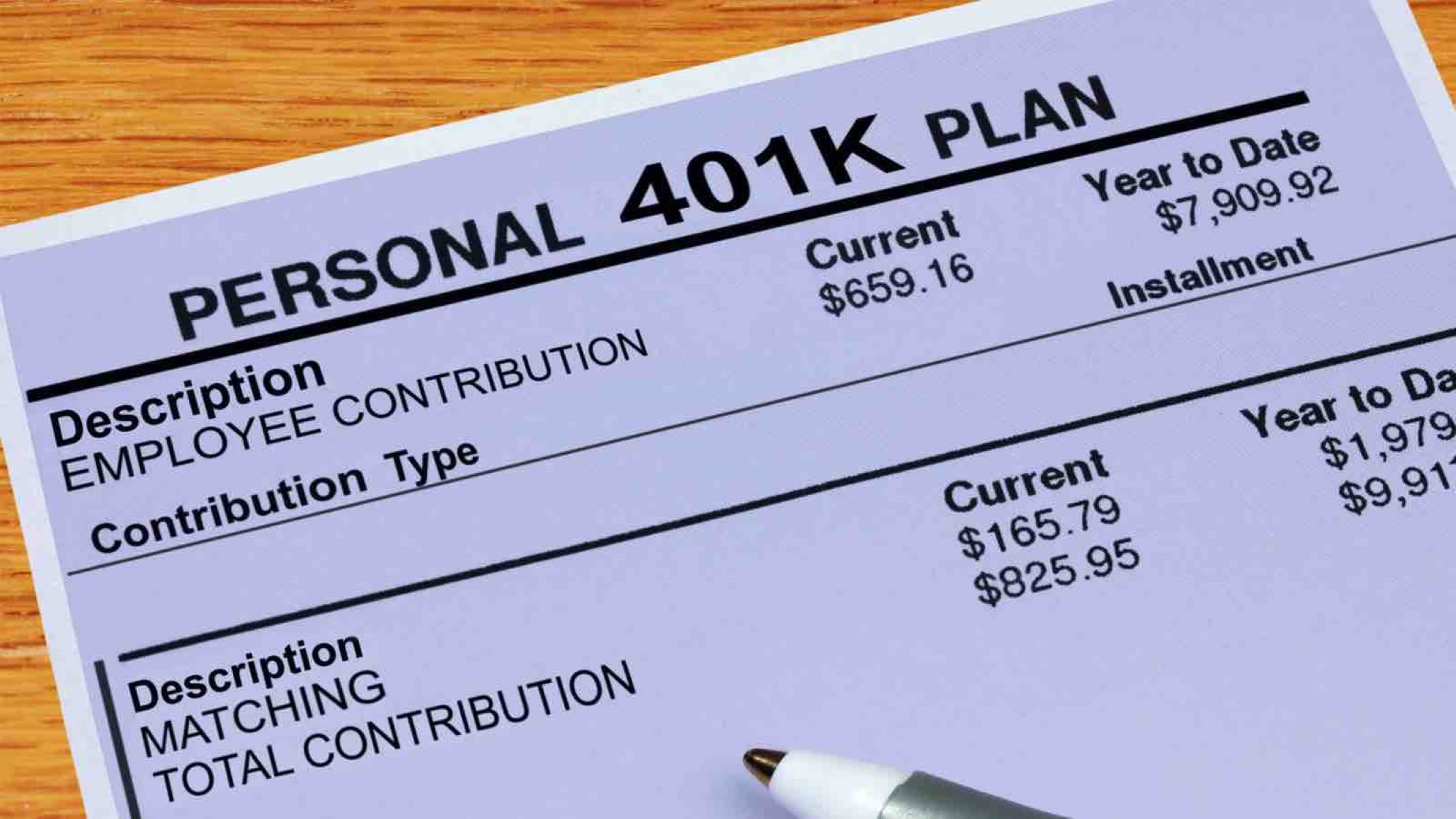

Finance
Who Must File Form 5500 For Health Insurance?
Published: October 30, 2023
Learn who is required to file Form 5500 for health insurance and ensure compliance with financial regulations. Stay informed on finance and insurance filing requirements.
(Many of the links in this article redirect to a specific reviewed product. Your purchase of these products through affiliate links helps to generate commission for LiveWell, at no extra cost. Learn more)
Table of Contents
- Introduction
- Overview of Form 5500 for Health Insurance
- Employers Subject to Form 5500 Filing
- Exemptions from Form 5500 Filing Requirements
- Determining When to File Form 5500
- Filing Deadlines for Form 5500
- Consequences of Failing to File Form 5500
- Penalties for Inaccurate or Late Form 5500 Filings
- Common Mistakes to Avoid When Filing Form 5500
- Conclusion
Introduction
Welcome to our comprehensive guide on Form 5500 for health insurance! If you’re an employer or a plan administrator responsible for managing health insurance plans for your employees, Form 5500 is an essential document that you need to be familiar with. This form is required by the Internal Revenue Service (IRS) and the Department of Labor (DOL) to ensure compliance with the reporting and disclosure rules for employee benefit plans.
Form 5500 is a complex document that requires detailed financial and administrative information about the health insurance plan. It provides valuable insights into the plan’s financial activities, investments, and operations, helping to ensure transparency and accountability.
In this article, we will provide an overview of Form 5500 and discuss who needs to file it for health insurance plans. We will also cover exemptions, filing deadlines, consequences of non-compliance, penalties for inaccuracies or late filings, and common mistakes to avoid. By the end of this guide, you’ll have a clear understanding of your obligations and responsibilities regarding Form 5500 for health insurance.
It’s important to note that this article is not intended to replace professional advice. If you have specific questions about your unique situation, it’s always recommended to consult with a qualified accountant, attorney, or benefits specialist.
Now, let’s dive into the details of Form 5500 for health insurance and explore who is required to file it.
Overview of Form 5500 for Health Insurance
Form 5500 is a reporting document that provides a snapshot of the financial and operational details of health insurance plans. It is used to monitor and ensure compliance with the Employee Retirement Income Security Act (ERISA), which governs the administration and disclosure requirements of employee benefit plans.
For health insurance plans, Form 5500 collects information related to the funding, administration, and participant demographics of the plan. This includes data on the plan’s assets, liabilities, contributions, expenses, and the number of participants covered. The form also requires information on service providers, such as insurance carriers and administrators.
The purpose of Form 5500 is to promote transparency and accountability by ensuring that employers and plan administrators maintain accurate records of their health insurance plans. It allows the IRS and DOL to monitor compliance, identify potential issues, and protect the rights of plan participants.
Filing Form 5500 also provides valuable information to plan participants, enabling them to make informed decisions about their health insurance coverage. It allows them to assess the financial stability of the plan, understand the plan’s benefits and costs, and evaluate the plan’s performance over time.
It’s worth noting that the level of detail required on Form 5500 may vary depending on the size and type of health insurance plan. Small plans with fewer than 100 participants may be eligible to file the simplified Form 5500-SF, which has less stringent reporting requirements compared to the full Form 5500.
Now that you have an overview of Form 5500 for health insurance, let’s explore which employers are subject to the filing requirements.
Employers Subject to Form 5500 Filing
Not all employers are required to file Form 5500 for health insurance plans. The filing requirements depend on various factors, including the number of participants in the plan and the type of employer sponsoring the plan.
In general, employers who are subject to the Employee Retirement Income Security Act (ERISA) and offer health insurance plans to their employees must file Form 5500. This includes employers who offer self-insured plans, fully insured plans, or a combination of both.
Employers with 100 or more participants in their health insurance plan at the beginning of the plan year are generally required to file the full Form 5500. This includes both active employees and retirees or other former employees who are still covered under the plan.
On the other hand, employers with fewer than 100 participants have some flexibility in their filing requirements. They may be eligible to file the simplified Form 5500-SF, which has reduced reporting requirements compared to the full Form 5500. However, there are certain conditions that must be met to qualify for the simplified filing. For example, the plan must meet specific eligibility criteria and must not be part of a larger plan that exceeds the 100 participant threshold.
It’s important to note that even if employers are not required to file Form 5500, they still have a responsibility to maintain accurate records and provide certain information to plan participants upon request. This includes summary plan descriptions (SPDs), summary annual reports (SARs), and other relevant documents that outline the key features and financial aspects of the health insurance plan.
Employers may also be subject to additional filing requirements depending on the type of health insurance plan they offer. For example, employers who have a Multiple Employer Welfare Arrangement (MEWA) or a Multiple Employer Trust (MET) may have additional reporting obligations beyond Form 5500.
Now that you understand which employers are generally subject to Form 5500 filing, let’s explore some exemptions from the filing requirements.
Exemptions from Form 5500 Filing Requirements
While many employers are required to file Form 5500 for their health insurance plans, certain exemptions exist that may relieve employers from this filing obligation. These exemptions are based on specific circumstances and can provide relief to smaller employers or those offering certain types of plans.
Here are some common exemptions from the Form 5500 filing requirements:
- Small Employer Exemption: Employers with fewer than 100 participants in their health insurance plan may qualify for the small employer exemption. If eligible, they are not required to file the full Form 5500 and may instead file the simplified Form 5500-SF.
- Fully Insured Plans: Employers who offer fully insured health insurance plans generally have limited filing requirements. The insurance carrier that underwrites the plan assumes most of the plan administration and reporting responsibilities.
- Church Plans: Plans established and maintained by churches or church-controlled organizations are generally exempt from ERISA regulations, including the filing requirements of Form 5500.
- Governmental Plans: Health insurance plans established and maintained by federal, state, or local government entities are typically exempt from ERISA regulations, and therefore from Form 5500 filing requirements.
- Top Hat Plans: Certain plans, often referred to as “top hat” plans, are maintained for a select group of management or highly compensated employees. These plans may be exempt from certain ERISA requirements, including Form 5500 filing, if they meet specific criteria.
It’s important to note that even if an employer qualifies for an exemption and is not required to file Form 5500, they are still responsible for maintaining accurate records and providing certain information to plan participants. This includes providing summary plan descriptions (SPDs), summary annual reports (SARs), and other relevant documents upon request.
It’s also worth mentioning that the exemptions mentioned above may have additional requirements and qualifications. It’s essential for employers to review the specific regulations and consult with an employee benefits professional or legal counsel to determine whether they qualify for a particular exemption.
Now that we’ve explored some exemptions from the Form 5500 filing requirements, let’s move on to understanding when employers need to file this form.
Determining When to File Form 5500
Determining when to file Form 5500 for your health insurance plan is essential to ensure compliance with the reporting requirements. The filing deadline depends on various factors, including the type of plan, the plan year, and the size of the employer.
The general rule is that Form 5500 must be filed annually, no later than the last day of the seventh month following the end of the plan year. For calendar year plans, this means the filing deadline is July 31st of the following year.
It’s important to note that different filing deadlines may apply to plans with non-calendar plan years. For example, if your health insurance plan has a plan year ending on March 31st, the filing deadline would be October 31st of the same year.
Additionally, employers who qualify for the small employer exemption and file the simplified Form 5500-SF have an extended filing deadline. They must file the form by the last day of the seventh month following the close of the plan year, with an automatic extension to the 15th day of the tenth month for plans on extension.
It’s crucial to carefully determine your plan year and understand the applicable filing deadline to avoid penalties for late filings. Failing to file Form 5500 on time can result in significant consequences, as we will discuss in the next section.
To determine the exact filing deadline for your health insurance plan, it’s recommended to refer to the official instructions provided by the Department of Labor (DOL) and the Internal Revenue Service (IRS). These instructions provide detailed information on the filing requirements, deadlines, and any exceptions or extensions that may be applicable to your specific situation.
Now that you understand when to file Form 5500, let’s explore the consequences of failing to file this important document.
Filing Deadlines for Form 5500
Filing Form 5500 for your health insurance plan by the designated deadline is crucial to avoid penalties and non-compliance. The filing deadlines for Form 5500 vary depending on the type of plan and the size of the employer.
For most health insurance plans with a calendar plan year, the general filing deadline is the last day of the seventh month following the end of the plan year. This means that if your plan year coincides with the calendar year, the filing deadline is typically July 31st of the following year.
However, there is an automatic extension available for certain plans. Employers who qualify for the small employer exemption and file the simplified Form 5500-SF have an extended deadline. They must file the form by the last day of the seventh month following the close of the plan year, with an automatic extension to the 15th day of the tenth month for plans on extension.
It’s important to note that if the filing deadline falls on a weekend or a federally recognized holiday, the deadline is extended to the next business day.
If an employer fails to file Form 5500 by the deadline, they may be subject to penalties imposed by the Department of Labor (DOL) and the Internal Revenue Service (IRS). These penalties can vary depending on the circumstances and the length of the delay.
The penalties for late filing of Form 5500 can be significant. The DOL can assess a penalty of up to $2,194 per day for each day the filing is late. Additionally, the IRS can impose a separate penalty of up to $25 per day, up to a maximum of $15,000 per filing.
To ensure timely and accurate filings, it is recommended that employers mark their calendars and set reminders well in advance of the filing deadline. It’s also essential to gather all the required information and work with the necessary professionals, such as accountants or benefits consultants, to prepare and file Form 5500 correctly.
Now that you understand the filing deadlines for Form 5500, let’s explore the consequences of failing to file this important document.
Consequences of Failing to File Form 5500
Failing to file Form 5500 for your health insurance plan can result in significant consequences, including penalties and potential legal issues. The Department of Labor (DOL) and the Internal Revenue Service (IRS) take the filing requirements seriously and impose penalties to ensure compliance with reporting and disclosure obligations.
Here are some of the consequences you may face if you fail to file Form 5500:
- Penalties: The DOL can impose penalties for late filing, incomplete filings, or failures to file altogether. The penalty for late filings can be up to $2,194 per day for each day the filing is late. This penalty can add up quickly, becoming a hefty financial burden for employers.
- IRS Audit: If an employer fails to file Form 5500, it may raise red flags with the IRS. This could result in increased scrutiny and the potential for an IRS audit. An audit can be time-consuming, expensive, and may lead to additional penalties if other compliance issues are discovered.
- Loss of Fiduciary Protection: Filing Form 5500 is a fiduciary responsibility under the Employee Retirement Income Security Act (ERISA). If an employer fails to fulfill this duty, they may lose certain legal protections associated with being a fiduciary. This exposes them to potential lawsuits and legal liabilities.
- Limited Legal Remedies: Failing to file Form 5500 can limit an employer’s legal remedies in case of a dispute or litigation related to the health insurance plan. Non-compliance with reporting requirements may weaken the employer’s position and limit their ability to defend against participant claims.
- Damage to Reputation: Non-compliance with Form 5500 filing requirements can damage an employer’s reputation. It can erode trust among employees, plan participants, and other stakeholders who rely on accurate and timely reporting. This can have negative implications for employee morale and business relationships.
It’s essential to prioritize the timely and accurate filing of Form 5500 for your health insurance plan to avoid these consequences. If you are unsure about your filing obligations or have difficulty gathering the necessary information, consulting with a knowledgeable employee benefits professional or legal counsel can provide guidance and ensure compliance.
Now that you understand the potential consequences of failing to file Form 5500, let’s discuss the penalties for inaccurate or late filings.
Penalties for Inaccurate or Late Form 5500 Filings
Ensuring the accuracy and timeliness of Form 5500 filings for your health insurance plan is crucial to avoid penalties and maintain compliance with reporting requirements. The penalties for inaccurate or late filings can be significant and can vary depending on various factors.
Here are some penalties you may face for inaccurate or late Form 5500 filings:
- Late Filing Penalties: If you fail to file Form 5500 by the designated deadline, the Department of Labor (DOL) can impose penalties. The penalty for late filings can be up to $2,194 per day for each day the filing is late. This penalty can accumulate rapidly and result in substantial financial consequences.
- Inaccurate Filing Penalties: If the information provided in your Form 5500 filing is inaccurate or incomplete, it can also lead to penalties. The DOL has the authority to impose penalties for the failure to include required information or for providing false or misleading information. These penalties can also vary depending on the specific circumstances.
- IRS Penalties: In addition to the penalties imposed by the DOL, the Internal Revenue Service (IRS) can also impose penalties for late or inaccurate Form 5500 filings. The IRS penalties can reach up to $25 per day, up to a maximum of $15,000 per filing. These penalties are separate from those imposed by the DOL.
- Waivers and Relief: In certain cases, the DOL may waive or reduce penalties if there is reasonable cause for the delay or inaccuracies in the filing. Employers who experience unforeseen circumstances or encounter difficulties beyond their control may be eligible for relief. However, it is essential to demonstrate that there was a genuine effort to comply and that the delay or inaccuracies were not intentional.
To avoid penalties and ensure accurate filings, it’s crucial to diligently gather and review all necessary information, work with professionals experienced in Form 5500 filings, and meet the designated deadlines. Regularly reviewing the official instructions provided by the DOL and the IRS can also help in preparing accurate and compliant filings.
Remember, timely and accurate Form 5500 filings contribute to the transparency and integrity of your health insurance plan, fostering trust among employees and plan participants. It ensures compliance with legal requirements and helps protect your organization’s reputation.
Now that you understand the penalties for inaccurate or late Form 5500 filings, let’s explore some common mistakes to avoid when filing.
Common Mistakes to Avoid When Filing Form 5500
Filing Form 5500 for your health insurance plan can be a complex process, and there are several common mistakes that employers should avoid to ensure accurate and compliant filings. By being aware of these mistakes, you can improve your filing process and minimize the risk of errors or omissions.
Here are some common mistakes to avoid when filing Form 5500:
- Missing or Incomplete Information: One of the most common mistakes is failing to provide all the required information in the Form 5500 filing. It’s important to carefully review the instructions and ensure all applicable sections are completed accurately.
- Incorrect Plan Classification: Ensuring the correct plan classification is crucial as it determines the appropriate filing requirements. Misclassifying the plan can result in filing the wrong form or missing specific reporting obligations.
- Failure to Include Schedules and Attachments: Form 5500 often requires additional schedules and attachments to provide detailed information about the plan’s financials and operations. Failing to include these required documents can result in incomplete filings.
- Not Reviewing for Accuracy: Neglecting to thoroughly review the Form 5500 filing for accuracy can lead to errors, discrepancies, and omissions. It’s crucial to double-check all the entered information and ensure it aligns with the plan’s records.
- Ignoring Plan Amendments: If there have been any significant plan amendments throughout the year, such as changes to benefits or administrative provisions, these must be reflected accurately in the Form 5500 filing.
- Missing or Late Filings: Failing to meet the filing deadlines or completely missing the filing is a common mistake that can result in penalties and other consequences. It’s important to mark the deadlines in your calendar and establish a filing process to ensure timely submissions.
- Not Seeking Professional Assistance: Form 5500 can be complex, and it’s easy to overlook certain requirements or misunderstand certain sections. Seeking professional assistance from accountants, benefits consultants, or legal counsel can help ensure accurate and compliant filings.
By avoiding these common mistakes, you can enhance the accuracy and completeness of your Form 5500 filing, reducing the risk of penalties and ensuring compliance with reporting requirements.
It’s important to note that this article provides general guidance, and specific situations may require additional considerations or professional advice. Always refer to the official instructions provided by the Department of Labor (DOL) and the Internal Revenue Service (IRS) and consult with professionals to ensure accurate and compliant Form 5500 filings.
Now that you are aware of common mistakes to avoid, let’s conclude our comprehensive guide on Form 5500 for health insurance.
Conclusion
Form 5500 is a vital document that must be filed by employers and plan administrators to provide valuable financial and operational information about their health insurance plans. It ensures transparency, accountability, and compliance with the reporting and disclosure requirements of the Employee Retirement Income Security Act (ERISA).
In this comprehensive guide, we’ve covered the essentials of Form 5500 for health insurance. We discussed the purpose and overview of the form, explored which employers are subject to the filing requirements, and identified exemptions from filing for certain employers. We also delved into determining when to file the form and highlighted the filing deadlines that should be adhered to.
Additionally, we explored the consequences of failing to file Form 5500, including penalties and potential legal issues. We emphasized the importance of accurate and timely filings to maintain compliance and protect the reputation of employers and their health insurance plans.
Lastly, we outlined common mistakes to avoid when filing Form 5500. By being aware of these pitfalls and taking proactive measures to prevent them, employers can ensure accurate and compliant filings, reducing the risk of penalties and other complications.
It’s important to note that this guide provides general information and should not replace professional advice. If you have specific questions or concerns regarding your unique situation, it is advisable to consult with an accountant, benefits consultant, or legal counsel to ensure accurate and compliant filings.
By understanding the requirements and diligently fulfilling your filing obligations, you can navigate the complexities of Form 5500 and maintain transparency and accountability in your health insurance plans. Compliance with reporting requirements benefits both employers and plan participants, fostering trust, and ensuring the continued success of your health insurance program.
To stay up to date with any changes or updates regarding Form 5500, refer to the official instructions provided by the Department of Labor (DOL) and the Internal Revenue Service (IRS). By staying informed and remaining proactive, you can navigate the world of health insurance plans with confidence.














